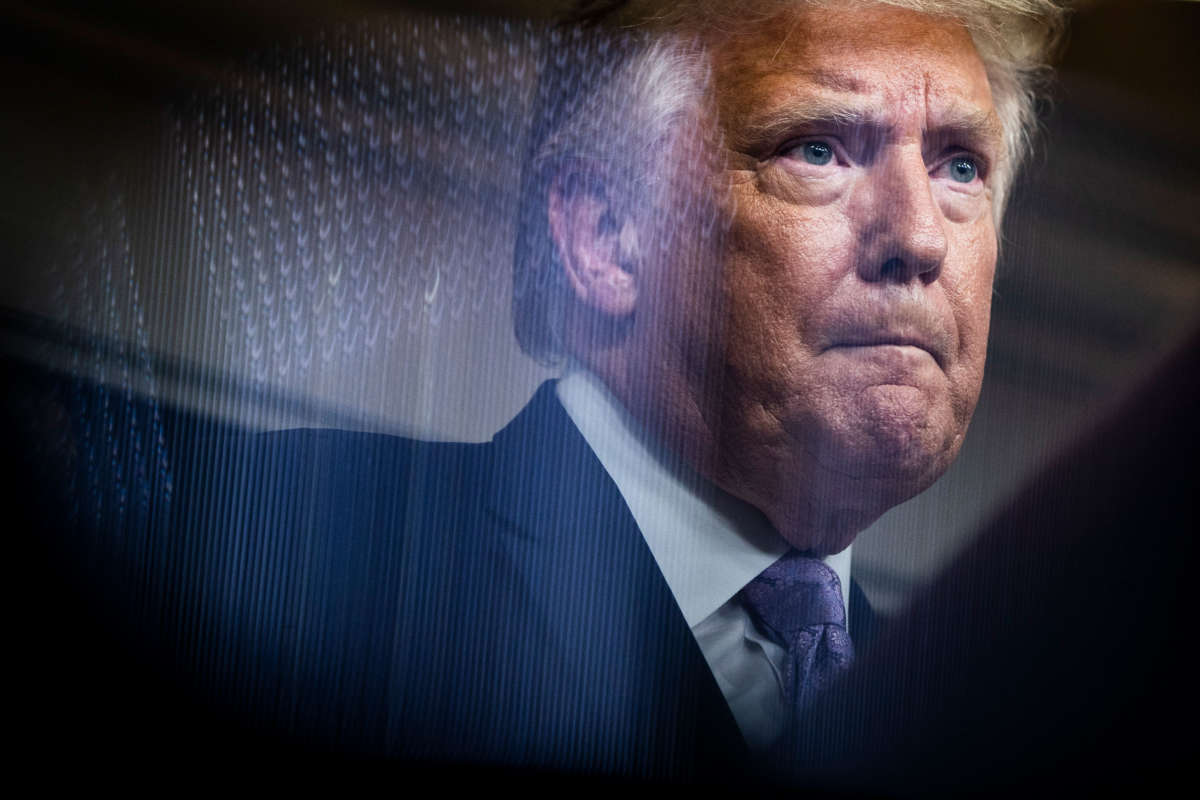Support justice-driven, accurate and transparent news — make a quick donation to Truthout today!
President Trump, speaking to reporters during a Monday press briefing, refused to condemn the shooting by 17-year-old Kyle Rittenhouse, who is charged with killing two protesters in Kenosha, Wisconsin, last week.
Rittenhouse, who is from northern Illinois, traveled to Kenosha in order to join other armed militia members who were attempting to quell uprisings in the city that had come about due to the shooting of Jacob Blake by police.
The teen is presently being charged as an adult with a number of offenses, including first-degree intentional homicide, first-degree reckless homicide, and attempted first-degree intentional homicide. Rittenhouse was also charged with first-degree recklessly endangering safety, and received a misdemeanor charge for possession of a dangerous weapon by a person under age 18, as it is illegal in Wisconsin for minors to carry assault rifles unless they are being used for hunting.
When Trump was asked to comment on Rittenhouse’s actions on Monday, he described what the teen had done as an act of self-defense.
“He was trying to get away from them, I guess, it looks like. I guess he was in very big trouble. He probably would have been killed,” Trump said.
The comments from the president contrast with the message he’s been pushing lately that he’s a leader who is focused on enforcing the law. Rittenhouse’s presence in Kenosha last week, wielding a weapon that he legally shouldn’t have been in possession of (and also being out past the city’s mandated curfew), goes against that motif, and demonstrates the president is willing to look the other way on criminal behavior in many situations, particularly if it involves right-wing violence.
Reporters also asked Trump whether his planned visit to Kenosha on Tuesday was wise, given that state leaders had requested that he refrain from coming to the city as it may make matters worse. Trump brushed aside those concerns, suggesting his presence may actually be a unifying force.
“Well, it could also increase enthusiasm,” Trump said, “and it could increase love and respect for our country. And that’s why I’m going.”
Trump’s visit to Kenosha, however, will not include meeting with the family of Blake, the man who was shot by police seven times in the back while attempting to enter his vehicle. It was this shooting — video of which was shared widely on social media — which propelled the uprisings in the city.
“They wanted me to speak. They wanted to have lawyers involved, and I thought that was inappropriate, so I didn’t do that,” Trump said on Monday. “But I did speak with the pastor of the family.”
Although Blake was not killed by the police (he was seriously injured and left paralyzed from the waist down) past attempts by Trump to meet with grieving families have been controversial. In 2017, for example, Trump infamously told a grieving military widow that her husband “knew what he signed up for,” a statement for which he was heavily criticized but that he later said was “totally fabricated.”
Democratic presidential nominee Joe Biden criticized Trump on Monday, disputing assertions by the current commander-in-chief that he will reduce violence in the United States.
“Does anyone believe there will be less violence in America if Donald Trump is reelected?” Biden asked during a campaign speech he gave.
Biden himself, however, condemned uprisings in various cities across the country, prompting challenges from progressives and activists. “Violence will not bring change. It will only bring destruction. It’s wrong in every way,” Biden said.
Biden, like a number of other Democratic Party members, is seemingly reluctant to support the current uprisings pushing for racial justice in the U.S., fearing that the unrest will help Trump in the 2020 races. However, these fears don’t appear to align with recent historical trends.
When uprisings against the police killing of George Floyd began in late May, many predicted that Trump’s polling numbers would go up. But in fact, Biden’s lead in the presidential election polls widened after those demonstrations began, and Americans support the protests in large numbers.
Matching Opportunity Extended: Please support Truthout today!
Our end-of-year fundraiser is over, but our donation matching opportunity has been extended! All donations to Truthout will be matched dollar for dollar for a limited time.
Your one-time gift today will be matched immediately. Your monthly donation will be matched for the whole first year, doubling your impact.
This matching gift comes at a critical time. As Trump attempts to silence dissenting voices and oppositional nonprofits, reader support is our best defense against the right-wing agenda.
Help Truthout confront Trump’s fascism in 2026, and have your donation matched now!
